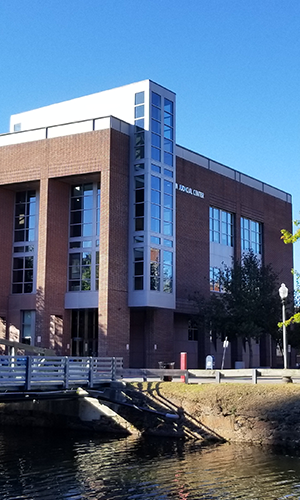Housing Court to Resume Selected In-Person Court Events as of July 1
| . Posted in News - 0 Comments
By Kimberly Rau, MassLandlords, Inc.
Starting July 1, 2021, the Second Amended Housing Court Standing Order 6-20 will take effect, changing how certain cases are heard by the courts. Some temporary modifications based on the COVID-19 pandemic will remain in place.

More housing court cases will be heard in-person as Massachusetts continues to re-open, but tier-1 eviction mediations will still be held virtually for the time being. (Shown here: the Northeast housing court – Lawrence session.)
Image credit: Mass.gov, Public Domain
The order allows each housing court to conduct its business both in-person and virtually. In some circumstances, a hybrid situation may be allowed, with some participants appearing in-person and others appearing virtually. In general, however, trials (including summary process, civil and small-claims) will be held in person. So will three specific types of events: contempt proceedings, motions requiring an evidentiary hearing (presenting evidence) and all situations where credibility must be assessed as determined by the Clerk-Magistrate and First Justice.
All other motions and events not mentioned above will continue virtually. This includes code enforcement cases, and summary process (eviction) mediations.
For Existing Cases
Cases filed as of July 1, 2021, will be scheduled for a virtual tier-1 (mediation) event. Should a tier-2 event be needed, it will proceed in person unless someone moves that their attendance be virtual and such motion is granted. Defaults and dismissals may be entered at the tier-1 event as necessary.
Cases that are pending as of June 30, 2021, will continue in the manner that they were scheduled.
Cases that are pending as June 30, 2021, but that do not have a court event scheduled, will proceed virtually for tier-1 events and in person for tier-2 events.
For New Cases
All attorneys should continue to e-file for summary process (eviction) cases. Litigants who are representing themselves are also encouraged to e-file. Trial dates will be determined by the court, so plaintiffs should not provide a trial date on the summary process summons and complaint. Instead, they should write “TBD by the court” in place of a date.
Filings of summary process cases for nonpayment must include a state-mandated affidavit of compliance.
All summary process cases will continue to be handled in the two-tier process established during Covid. The first event will be held virtually no sooner than 14 days after the complaint is entered. This “tier-1 event” is a chance for the case to be assessed and gives the opportunity to review rental assistance options. If there is a pending application for rental assistance, the case will not go forward.
If the mediation is unsuccessful and the case is able to continue, a tier-2 event (trial) will be scheduled “as soon as practical, but no sooner than 14 days after the tier-1 event.” If one or both parties do not show up to the event, defaults and dismissals may be entered as appropriate after notice.
Executions for Possession
If 90 days has passed and an execution for possession has expired, a plaintiff may request a new execution in writing. These do not require a hearing, as they will be issued under the same terms as the original execution. If the plaintiff needs something changed (for instance, the amount of rent owed), a motion to amend must be filed.
New Efficiency in Scheduling
With this standing order, the courts have also changed how in-person hearings are scheduled. Prior to the pandemic, everyone with a hearing that day was required to show up at 9 a.m. Now, the court is scheduling in-person cases in two-hour blocks to minimize crowding. Not only will it keep the number of people in the courtroom at one time down, but this change should be much more efficient than the former method.
We will continue to provide updates on court proceedings as they occur.




